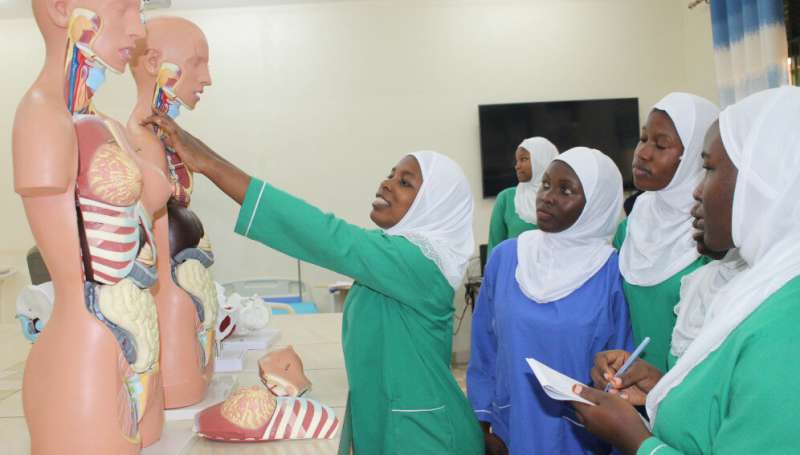[ad_1]

A primary report into gender parity in instruction has discovered a entire absence of information on science education and learning from lower-money nations around the world, exacerbating a circumstance exactly where pockets of “excessive exclusion” nonetheless exist.
The UNESCO report, “Deepening the discussion on those people even now still left behind,” analyzed major and secondary training details from 120 international locations, but only 28 of the 82 minimal- and minimal-center-revenue nations had been represented, and there was no assessment details for science in any small-income place.
Restricted knowledge accumulating capacity and a absence of systematic nationwide assessments for pupils prevent researchers from acquiring a full image of how mastering results are acquiring in the world wide South, claimed Manos Antoninis, director of the UNESCO Global Education Monitoring (GEM) device, which printed the report on 27 April.
And science may also be viewed as a lesser priority than studying and math.
“There is a fantastic plenty of sample to give us a excellent feeling of wherever things are, but it can be considerably from complete,” Antoninis instructed SciDev.Internet.
“What you definitely have to have is a more time expression [data monitoring] application … so that [policymakers] can improved inform their education procedures.”
The report highlights sizeable progress in attendance and enrolment in education and learning in the final 20 a long time, with a gender hole of fewer than one percentage issue in primary and secondary schooling.
But in some countries in Sub-Saharan Africa and South Asia, girls’ participation lags considerably at the rear of, even though finding out outcomes are bad for the two sexes.
20 years
“Numerous girls in rural parts afflicted by poverty in Sub-Saharan Africa … are still combating from seemingly shut doorways to achieve entry to schooling,” writes UNESCO director Audrey Azoulay in a foreword to the report. “In the most serious situation, women are outright deprived of mastering in Afghanistan, sending us back 20 many years.”
Whilst boys fare much better than girls in math in early training, in afterwards several years the hole is lowered and in some cases reversed, even in the poorest nations around the world, according to the report.
It also notes that gender gaps in reading and math are strongly correlated—when girls outperformed boys in arithmetic, they also strongly outperformed them in reading through.
This may perhaps explain the reduce likelihood of girls pursuing occupations in science, engineering, engineering and math (STEM), despite their attainment edge above boys in numerous countries, Antoninis said.
They might love even greater comparative advantages in examining and choose for occupations relating to people strengths, the report suggests.
Societal norms
Nevertheless, the details does not completely capture gender limitations this sort of as societal norms and stereotypes, he extra.
“There is the opportunity for stereotypes, and for biases that may make us think that [girls] are a lot more successful in one particular subject than in the other,” he explained.
The report cites preceding study which discovered that personal attitudes toward instruction as nicely as “situational” obstacles this sort of as poverty were the most substantial elements major to girls in Malawi, Nigeria and Sierra Leone leaving school early.
“The main source of exclusion is norms that continue to just take the instruction of ladies as next fee, mainly because ladies and ladies are expected to be responsible for households and males are intended to be the breadwinner,” claimed Antoninis.
Nur Nabihah Hashim is a trainer education specialist who prospects the Ladies in Engineering, Math and Science (GEMS) and Brokers of Tech programs at Malaysia’s Arus Academy, a studying-concentrated social enterprise.
She believes that difficulties in rising STEM enrolment are commonly owing to a deficiency of purpose versions, highlighting as an case in point the tiny proportion of girls globally who have preferred a vocation in details and artificial intelligence.
“We require to make sure girls you should not only choose STEM occupations, but that they also select to remain in those people regions,” she explained to SciDev.Web.
Rana Dajani, a professor of biology and biotechnology at Hashemite College in Jordan, launched a non-profit corporation that encourages little one literacy. She says that in many Center-Japanese nations ladies are overrepresented in tertiary education, but don’t automatically go on to pursue STEM professions.
“What non-governmental businesses can do is dispel these myths about how there is 1 way of good results which is male-centric,” she informed SciDev.Internet.
“They can be the facilitator that provides UN organizations, governments, women from unique fields of apply into a dialogue about transforming mindsets.”
Girls excel in language arts early, which may possibly demonstrate the STEM gender gap in grown ups
Presented by
SciDev.Web
Quotation:
Science absent in very poor countries’ education and learning details (2022, May perhaps 11)
retrieved 22 May well 2022
from https://phys.org/information/2022-05-science-absent-weak-international locations.html
This document is subject to copyright. Apart from any truthful dealing for the function of non-public research or investigate, no
portion may well be reproduced with no the created permission. The written content is delivered for facts reasons only.
[ad_2]
Source url




More Stories
Bilingual books about winter – Bilingual Marketplace
The Japanese Shinto Faith – Learn Something Interesting
Improving science literacy means changing science education